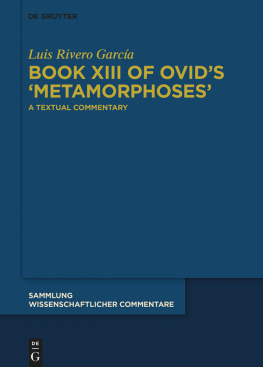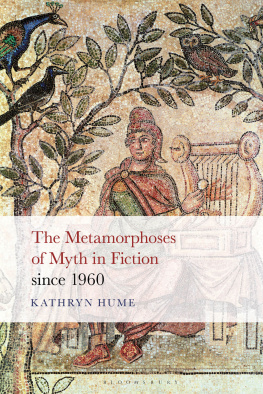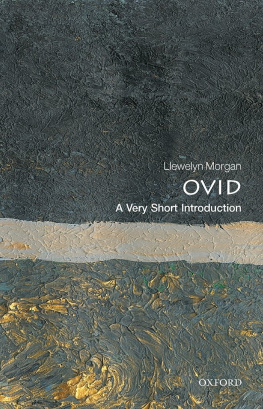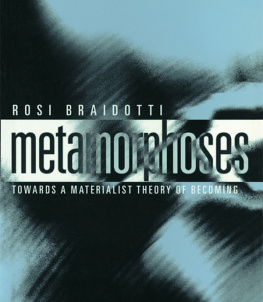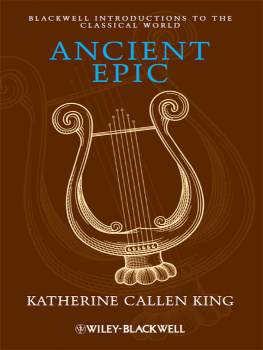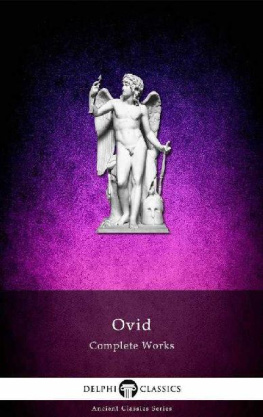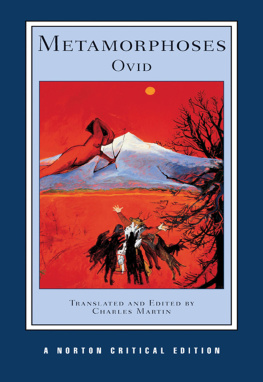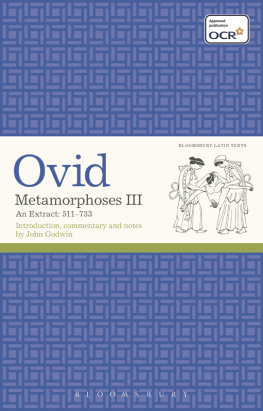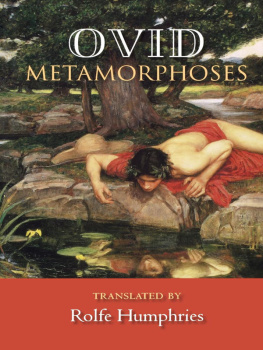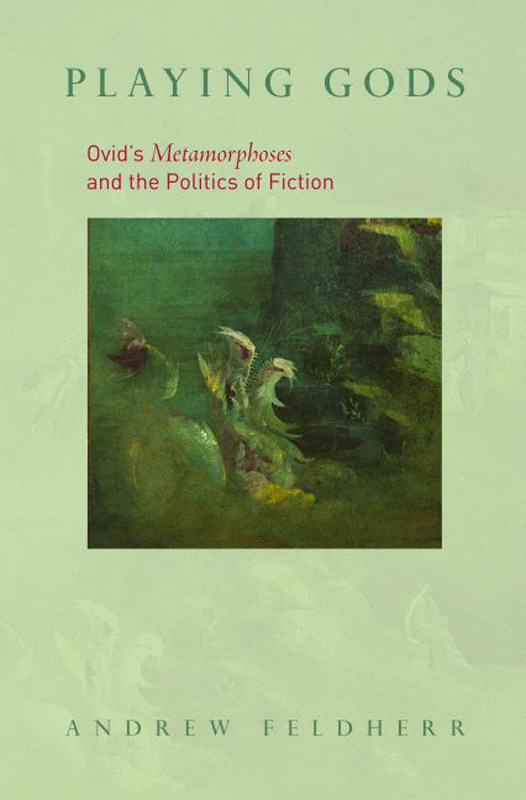
Playing Gods
OVIDS METAMORPHOSES AND
THE POLITICS OF FICTION
Andrew Feldherr
PRINCETON UNIVERSITY PRESS
PRINCETON AND OXFORD
Copyright 2010 by Princeton University Press
Published by Princeton University Press, 41 William Street, Princeton,
New Jersey 08540
In the United Kingdom: Princeton University Press, 6 Oxford Street,
Woodstock, Oxfordshire OX20 1TW
press.princeton.edu
All Rights Reserved
Library of Congress Cataloging-in-Publication Data
Feldherr, Andrew, 1963
Playing gods: Ovids Metamorphoses and the politics of fiction/Andrew Feldherr.
p. cm.
Includes bibliographical references and index.
ISBN 9780691138145 (hardcover: alk. paper) 1. Ovid, 43 B.C.17 or 18 A.D.
Metamorphoses. 2. Fables, LatinHistory and criticism. 3. Politics and literature
Rome. I. Title.
PA6519.M9F45 2010
873.01dc22 2010010198
British Library Cataloging-in-Publication Data is available
This book has been composed in Sabon and Caslon Open Face
Printed on acid-free paper.
Printed in the United States of America
10 9 8 7 6 5 4 3 2 1

For Erich Gruen and in memory of Joan Gruen
Contents

Acknowledments

Versions of some material presented here have been published before: part 2 of in Hermathena 17778 (20045): 12646. I am grateful to Cambridge University Press, the Johns Hopkins University Press, Fabrizio Serra Editore, Walter de Gruyter, and Trinity College, Dublin, respectively, for permission to include this material here. Thanks, too, to the anonymous readers of several of these journal submissions for their valuable suggestions.
Philip Hardie has read through several versions of this project with unsettling acumen and unflagging generosity. If he ever feels the need to read it again, he will see how much I owe him. Detailed suggestions on the entire manuscript were also offered by Carole Newlands and Denis Feeney. Stephen Hinds gave valuable comments as well. I was extremely fortunate to have the anonymous referees assigned by Princeton University Press; their comments succeeded in making me think again about many aspects of this work at a time when that was the last thing I wanted to dothough of course they couldnt work miracles. Audiences at Berkeley, Leeds, Trinity College Dublin, Williams, Lehigh, Birmingham, Mnster, and New York University all provided inspiration and advice. Simon Price shared a draft of his then unpublished article on local religions in Asia Minor, and Barbara Kellum another on the art of freedmen. The scholars named above will race to distance themselves from much that they find in this book, and these expressions of gratitude should not be construed as placing obstacles in their path.
It would be an exaggeration to say that I could not have written this book anywhere but Princeton, but both the process and the product would have been much poorer and less interesting without the colleagues and students I have known here. I hope that such friends as Mark Buchan, Elaine Fantham, Bob Kaster, Josh Ober, Ruth Webb, and Froma Zeitlin will recognize with more pleasure than distress the impact they have had on my work.
Of them all, I single out Denis Feeney for special thanks. Few authors are lucky enough to have their ideal reader just down the hall. And if this could have been a mixed blessing, Deniss friendship and belief that this project would and should eventually be finished have more than compensated for the frustration of his already having said most of what I wanted to and for my despair at ever matching the standards set by his own work.
By contrast, my daughters Rebecca and Miriam have made practically every stage of writing slower and more difficult. Butin retrospectI love them all the more for that.
I also owe a great debt to Rob Tempio at Princeton University Press for his patience and very valuable advice during the revision process. Thanks too to Nathan Carr for his help in seeing the manuscript through its final stages and to my copy editor Brian MacDonald for frustrating my intentions by making the argument a little more comprehensible. Meredith Safran helped in preparing the index.
Although I have not specifically asked for their help on this project, working on it has made me remember with particular gratitude three of my teachers at Berkeley. It was a pleasure to read Ovid in the text prepared by W. S. Anderson, and his own commentaries and articles on the poem have established him in my mind as the scholar I would be most reluctant to disagree with. I have no idea what Tom Rosenmeyer would have made of this book, but I am very sad not to be able to ask him. Finally, the inspiring teaching of Tom Habinek lies behind everything I will ever write about Latin literature.
It is in general an excellent idea to dedicate books to eminent figures in the field. Except in the hardest cases, such a move will effectively keep them from ever telling you honestly what they think of your work. It certainly disqualifies them from reviewing it. Here, though, I am at a disadvantage since, much as I hope to profit from the pietas of his legions of students, friends, and colleagues, Erich Gruen himself possesses relatively little clout in Ovidian studies. Nor can I think of any particular aid or advice he has given me on this bookaside from his decade-long campaign to make sure I remained employed to complete it. I offer it, nevertheless, to Erich and to Joans memory, in gratitude for many years of friendship and for the example of their life together.
Introduction

Ovid begins the Metamorphoses by promising his readers, quite literally, the world. The gods who inspire the poets song are asked to lead his narrative from the first creation of the cosmos to my own times (1.34). Alongside the grandeur of the project they set in motion, however, the lines already signal a number of questions that Ovids audience will have to confront throughout the fifteen books that follow. To start with, the technical terms used to describe the composition of the work present it as a kind of hybrid, paradoxically claiming the qualities of two antithetical poetic forms: on the one hand, the song will be unbroken (perpetuum, 1.4) like the extended, homogeneous narratives of epicand, indeed, the Metamorphoses marks Ovids first use of the distinctive meter of epic poetry, the dactylic hexameter. On the other, the word that means lead down (deducite, 1.4) also means spin fine and was used in this meaning by Latin poets to describe the writing of short, exquisitely crafted pieces. How can Ovids poem be at once short and long, grand and refined? The contradictory formal expectations raised by this description relate to a distinction in strategies of reading that are at the core of this book and that are complemented by the second paradox the brief proem sets in play. The word


